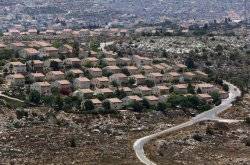Israelis and Palestinians have held a second round of negotiations, and Israel's chief representative at the talks predicted the US-brokered process would lead to dramatic Israeli decisions.
Tzipi Livni coupled her forecast with acknowledgement that at least one partner in Israel's right-wing coalition opposed the goal set by the United States to create a Palestinian state alongside a secure Israel.
Livni, speaking on Israel Radio before talks convened on Tuesday in Jerusalem, said "there will be dramatic decisions" by Israel at the end of the negotiating process.
She said that in the meantime, both sides had agreed not to disclose details about their deliberations to build trust.
"We are arguing, but we are arguing inside the room," she said.
Illegal settlement expansion
The negotiations were renewed last month in Washington after a three-year standoff over Israeli illegal settlement expansion in the occupied West Bank and East Jerusalem.
The first round of talks was held at an undisclosed location in Jerusalem on August 14, despite Palestinian consternation over Israel's approval in the run-up to the meeting of plans for 3,100 new illegal homes for settlers.
An Israeli statement issued after Tuesday's negotiations said that "both sides parted agreeing the meeting has been serious, and that they will continue the talks at a near date".
Livni and Yitzhak Molcho, a senior aide to Prime Minister Binyamin Netanyahu, represented Israel in the deliberations with Palestinian chief negotiator Saeb Erekat and Mohammed Shtayyeh, an adviser to President Mahmoud Abbas.
Israel has rejected criticism of its illegal settlement policy, saying the new units would be erected in enclaves it intends to keep in any future deal.
Most countries, as well as the United Nations and the European Union, view all settlements Israel has built on occupied land as illegal.
No details were given after last week's session that was widely believed to have focused on setting an agenda for discussing core issues such as borders, security and the future of illegal settlements, and Jerusalem and Palestinian refugees.
"It is no secret that there is at least one party [in the Israeli government] that sees negotiations as wrong, that opposes two states for two peoples," Livni said, referring to the pro-settler Jewish Home faction.
She called on the main opposition Labour Party to "lend its support now" to the government's efforts, suggesting such political backing could help achieve a land-for-peace deal.
In a one-line response to Livni's reference to his party's opposition to a two-state solution of the Israeli-Palestinian conflict, Jewish Home's leader Naftali Bennett wrote on his Facebook page: "Get over it."
PHOTO CAPTION
Israel's illegal settlement activity was the main reason behind the breakdown of the last round of talks [Reuters]
Aljazeera


 Home
Home Discover Islam
Discover Islam Quran Recitations
Quran Recitations Lectures
Lectures
 Fatwa
Fatwa Articles
Articles Fiqh
Fiqh E-Books
E-Books Boys & Girls
Boys & Girls  Hajj Rulings
Hajj Rulings Hajj Fatwas
Hajj Fatwas














